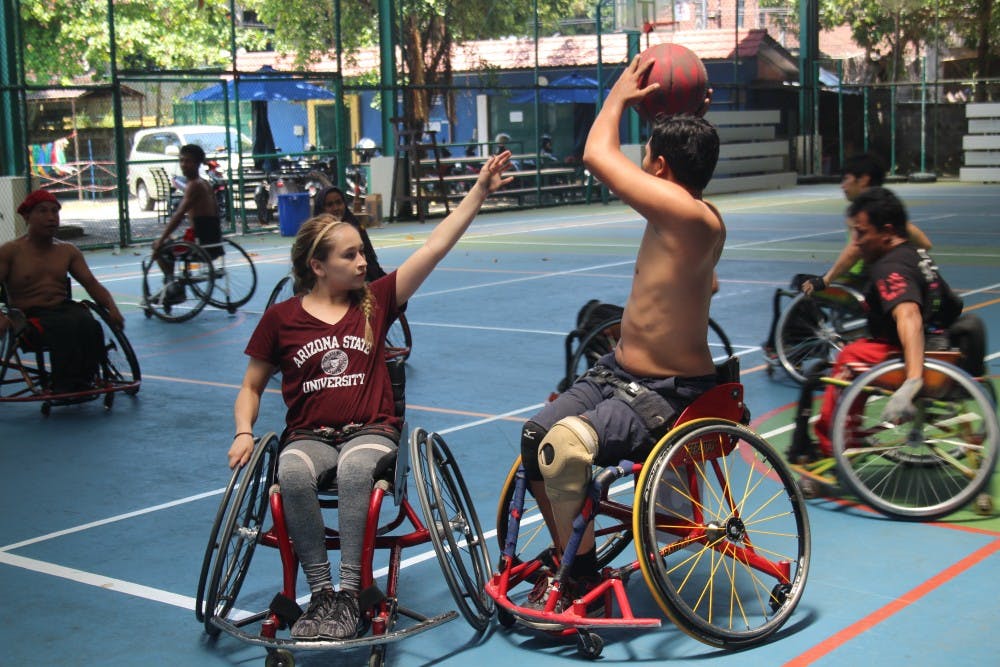Christina Chambers, a Parks and Recreation Management sophomore, and Donald Santoso, a law graduate student, traveled to Bali, Indonesia in October to run a weeklong camp for the Bali Sports Foundation's wheelchair basketball team.
The camp hosted a group of 15-20 people from various provinces across Indonesia between the ages of 20 and 40, and were accompanied by a staff of 5-8 people depending on the day.
Santoso, an Indonesian citizen, represented the country as a player on the their National Wheelchair Basketball Team in an international tournament last summer. His relationship with the various organizations and government officials involved in the tournament led to him being invited to the camp this year.
"I offered to help with their plans to expand the program to more regions and populations in Indonesia," Santoso said. "Part of this plan was to bring in players and coaches from the U.S. to run a training camp."
Chambers worked as an assistant coach, whereas Don and a coach from New Mexico took the role as head coaches. The group ran morning and afternoon sessions that focused on developing the athletes's skills.
Santoso said the group needed to keep the goal in sight the first few days of the camp as they dealt with conflicts like broken air pumps, cancelled flights for players, a lack of basketballs, and difficulty communicating with staff and players.
"These issues were not necessarily a hinderance to our mission, but we just had to learn to be resourceful and focus on making the most of what we had," Santoso said. "My goal was to inspire the people there as athletes, to enable them with confidence as individuals, encourage structure and stability in their programs, offer guidance and hope in developing the sport across Indonesia, and ultimately build relationships with everyone we met there."
Santoso said the players and coaches from the U.S., as well as the Indonesian players and staff hosting the camp made the trip impacted him personally.
"Honestly, they are the only reason why I continue to play wheelchair basketball, because they make it possible for me to do something greater with the sport, and help positively impact others," Santoso said.
Santoso said returning from Indonesia was difficult for him because he could tangible see the benefit of the camp on his life, as well as the Indonesian athletes.
"It is hard to stay motivated with the daily routine in the U.S., when I felt like I just spent every minute of the past week helping push for positive changes in another country," Santoso said. "While this was a gradual realization, I am learning to focus on having the perspective that I should not wait for opportunities like the Indonesia trip to be a positive influence."
Santoso said his biggest takeaway from the trip was learning to live fully wherever he is, in whatever he is doing.
"Rather than waiting once a year, I am learning to find those moments everyday to share my God-given talents and experiences with others," Santoso said.
Chambers said that although she went to Bali to coach and train the Indonesian athletes, they taught her more than she could teach them in a lifetime.
"I experienced true joy and a sense of community and family. It was so humbling being with people who were in some of the worst circumstances that I have ever seen, but they were happier than I am with my comfy lifestyle," Chambers said. "It was crazy because there were language barriers and we just communicated on a whole other level of understanding.
ASU's wheelchair basketball team is currently considered a club sport, but Chambers hopes to see it join the NCAA and be an official collegiate team and be recognized by the athletics department.
"That takes awareness, funding, participation and support," Chambers said. "I think it's important that ASU has adaptive sports and athletics because it gives disabled athletes opportunities that I think every one should experience."
Stephen Binning, a future ASU student, joined the team last January after the team's director reached out to him to see if he was interested in playing. Binning said the team has the potential to influence other colleges.
"We are the only collegiate team on the western half of the country. The team has the potential to be something big, not only in the Phoenix area, but it could kick-start more colleges in the West to start programs of their own," Binning said.
Binning said it's very important for ASU to invest in the wheelchair basketball team and promote events that they do.
"Exposure is everything for disabled sports. The more people that can get to see what we do the better. There are a lot of people that don't realize that disabled people have the same opportunities as able-bodied people," Binning said. "The more people realize that is when disabled sports will get more respect. ASU has a huge opportunity to help make that happen."
Reach the reporter at sphaas@asu.edu or follow @_SavannahHaas on Twitter.
Like The State Press on Facebook and follow @statepress on Twitter.




